|
|
|
Sort Order |
|
|
|
Items / Page
|
|
|
|
|
|
|
| Srl | Item |
| 1 |
ID:
168249
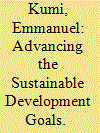

|
|
|
|
|
| Summary/Abstract |
In September 2015, the Sustainable Development Goals (SDGs) were endorsed by the United Nations General Assembly as the cardinal agenda for guiding future global development. In financing the SDGs, there has been an increasing call on stakeholder diversification by leveraging on other non-state actors and private finance including philanthropic institutions in influencing, delivering and advancing the SDGs. Drawing on insights from the Ghanaian philanthropic sector, I show that philanthropic institutions play complementary roles in service delivery, support civil society organisations to engage in active action and advocacy, and enhance paradigm shifts in development thinking around the SDGs. I argue for the need in embracing complexity thinking that recognises that the attainment of the SDGs is dependent on the creation of an enabling environment and effective multi-stakeholder consultation.
|
|
|
|
|
|
|
|
|
|
|
|
|
|
|
|
| 2 |
ID:
168243
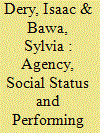

|
|
|
|
|
| Summary/Abstract |
This article examines contextually-grounded perspectives on the socio-political significance of marriage in contemporary Ghanaian society. Drawing on qualitative interviews among men and women in northwestern Ghana, this article argues that, beyond historicizing the institution of monogamous marriage, women’s agency in desiring, and navigating marriages are performatively agentic and tied to attaining a myriad of socio-cultural, economic and political capital. Situated within the constrained articulations of participants, our findings alert us to complex negotiations and manoeuvres through which men and women aspire for specific forms of masculinities and femininities within the larger gender hierarchies.
|
|
|
|
|
|
|
|
|
|
|
|
|
|
|
|
| 3 |
ID:
168241
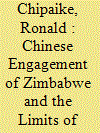

|
|
|
|
|
| Summary/Abstract |
This article contends that Zimbabwe’s agency in its engagement with China has been limited and at best circumscribed. This owes to factors such as indifference by state authorities to cooperation with civil society actors in negotiating with Chinese actors, the desperation of the The Zimbabwe African National Union – Patriotic Front regime in the face of isolation by erstwhile partners as well as the opacity and secrecy that characterizes significant areas of the Zimbabwe–China relationship. The pressing need for critical institutions such as parliament to play independent oversight roles as well as the creation of space for civil society watchdog functions are highlighted as key enablers if Zimbabwean agency is to generate positive gains from the country’s engagement with China.
|
|
|
|
|
|
|
|
|
|
|
|
|
|
|
|
| 4 |
ID:
168242
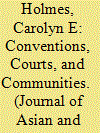

|
|
|
|
|
| Summary/Abstract |
The Convention for the Elimination of All Forms of Discrimination Against Women is central in outlining the gendered dimensions of human rights. India ratified this treaty with the reservation that it would be complied with only in accordance with the religious personal law. This article will examine the ways in which the convention interfaces with religious personal law, and the efficacy of the convention in both top-down and bottom-up reform of religious personal laws, as well as secular laws
|
|
|
|
|
|
|
|
|
|
|
|
|
|
|
|
| 5 |
ID:
168246
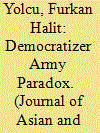

|
|
|
|
|
| Summary/Abstract |
The main paradox of the civil–military relations theory has been the protection of the political sphere from the military, which is administered by the politicians. The new dilemma lies under the paradox that occurs when the political sphere is entirely co-opted by the military, which is legitimized through democratization instead of protection of the civilian sphere. The question regarding the continuity of the pathology, the military superiority over the civil administration, has been largely omitted. This study is an attempt to respond to this conundrum related to the continuity of pathological civil–military relations. The main focus is the pathology that occurs when the military is the modernizer or the democratizer in a country. The study uses process tracing to collect the data as research attempts to unravel the rationale behind the continuity of military dominance in politics. In doing so, it will attempt to trace the causality between the lack of democratization and military dominance over politics in the case of Algeria.
|
|
|
|
|
|
|
|
|
|
|
|
|
|
|
|
| 6 |
ID:
168245
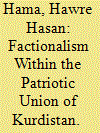

|
|
|
|
|
| Summary/Abstract |
Institutional conflicts within the Patriotic Union of Kurdistan (PUK) have existed ever since the party’s founding in 1975 as a result of a merger of three different factions. The conflicts were successfully managed in a way that did not hurt the party’s overall functioning until the Gorran movement, led by Nawshirwan Mustafa, split off in 2009. However, it was the withdrawal of party leader Jalal Talabani from political and public life due to a stroke suffered in 2012 that most damaged the party’s ability to function, and widened factional cracks within the organization. The absence of Talabani led to the emergence of intense competition between various groups within the PUK for influence and positions. Consequently, PUK policies on a number of important issues in Iraqi Kurdistan have been indecisive and weak since approximately 2013. This research will discuss the PUK’s inconsistent policies and their negative implications for the Kurdistan Region. Furthermore, it will argue that the PUK’s internal conflicts emboldened its rival, the Kurdistan Democratic Party, between the years 2014 and 2018.
|
|
|
|
|
|
|
|
|
|
|
|
|
|
|
|
| 7 |
ID:
168247
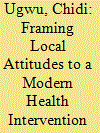

|
|
|
|
|
| Summary/Abstract |
Interventionists usually blame cultural factors and traditional attitudes for non-compliance of target populations, a framework Didier Fassin terms as culturalism. Despite their efforts, what the Roll Back Malaria employees find in southeastern Nigeria is a ‘troubling’ nonchalance towards the programme because target populations’ perceptions of malaria differ from the donor/programme perspective. The RBM employees cast the local attitude as culturalism, accordingly framing their exhortations in terms of this discourse. How the Roll Back Malaria employees deployed culturalism to fit with the neoliberal individualizing framework of current international health practices is one more nuanced analytical perspective the article brings to intervention literature.
|
|
|
|
|
|
|
|
|
|
|
|
|
|
|
|
| 8 |
ID:
168248
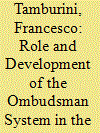

|
|
|
|
|
| Summary/Abstract |
The institution of the Ombudsman is aimed at defending values such as human rights and the respect for the rule of law against any form of abuse or arbitrariness. Many academic studies have been devoted to the Ombudsman in its different developments around the world, but not to the Maghreb area. This article wants to shed light on the characteristics of the Ombudsman in Algeria, Mauritania, Morocco and Tunisia. The comparative exam of the different North African Ombudsmen will point out how the institution was able to survive only in states where a transition to democracy was truly in place.
|
|
|
|
|
|
|
|
|
|
|
|
|
|
|
|
| 9 |
ID:
168244
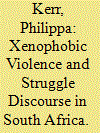

|
|
|
|
|
| Summary/Abstract |
This paper argues that xenophobia in South Africa is entangled in discourses of liberation struggle, which are often used to justify anti-foreigner violence. We first examine some existing academic explanations for xenophobia, namely internalised racism, poverty/inequality, nationalism, and township and informal settlement politics. To avoid deterministically explaining xenophobia as ‘caused’ by any of these factors, however, we introduce a concept from social psychology, the concept of ‘working models of contact’. These are common frames of reference in which contact between groups is understood in terms of shared meanings and values. Xenophobic violence is not caused but instantiated in ways that are explained and justified according to particular understandings of the meaning of the ‘citizen-foreigner’ relationship. We then review three case studies of xenophobic violence whose perpetrators constructed a model of contact in which African ‘foreigners’ were undermining the struggles of South Africans in various socio-economic contexts. We also examine three cases where xenophobic violence was actively discouraged by invoking an inclusive rather than divisive form of struggle discourse. Thus the nature of the struggle itself becomes contested. We conclude by considering some dilemmatic implications that our analysis provokes.
|
|
|
|
|
|
|
|
|
|
|
|
|
|
|
|
|
|
|
|
|